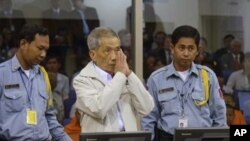The United Nations-backed tribunal in Cambodia has extended the sentence of a former Khmer Rouge torture chief to life in prison.
Kaing Kek Iev, better known as Duch, had appealed to reduce his 35-year-term, but the court ruled his harsh crimes instead deserved an even longer sentence.
Comrade Duch, who ran the main torture center of the Khmer Rouge during their brutal rule in the 1970s, was found guilty in 2010 of overseeing the torture and execution of more than 12,000 people at Tuol Sleng prison, also known as S-21, and gave him a commuted 19-year sentence.
Although Duch admitted his role and asked for forgiveness, he surprised the court and upset victims by asking for acquittal. The 69-year-old argued he was a junior official only acting on orders and that more senior leaders should be held responsible because they did much worse.
The tribunal’s Supreme Court disagreed. Speaking through a translator, the judge said Duch’s sentence must be proportionate to the crimes he committed.
“The accused is responsible for detention, interrogation, torture, enslavement, and execution of a number of individuals who were not political enemies,” he said.
The ruling ends the first and only successful prosecution by the United Nations-backed tribunal.
The decision Friday was largely welcomed by observers and critics who say the court has not pursued cases against former Khmer Rouge aggressively enough. At the court, survivors of the Tuol Sleng prison camp cheered the ruling.
Speaking to reporters after the verdict, Bou Meng said he was 100 percent satisfied with the court’s decision and the trial chamber is an example of a world court.
There were a few dissenters to Friday’s verdict, including one of the tribunal’s main observers.
Clair Duffy with the Open Society Justice Initiative said the life sentence violated Duch’s rights, arguing that it failed to account for eight years when he was illegally detained by the Cambodian military.
“They gave him a five year reduction for the violation of his rights at trial and even the prosecutor agreed that that was correct. And by majority, mainly the national judges and one international voting with them, they've given absolutely no recognition for that,” Duffy stated.
Since its founding in 2005, the court has spent close to $200 million and been dogged by allegations of political pressure to limit prosecutions.
A second trial is underway of the three most senior surviving leaders of the Khmer Rouge. They are former chief ideologist Nuon Chea, head of state Khieu Samphan, and foreign minister Ieng Sary.
Cambodia’s Prime Minister has said the second trial should also be the last and warned further prosecutions could split the country.
Last year, a United Nations-appointed judge was forced to step down after allegations that two other cases were dismissed after improper investigations.
Cambodian authorities have refused to appoint his replacement, who has shown a willingness to prosecute more cases.
Under the leadership of Pol Pot, the Khmer Rouge executed, tortured, starved, and worked to death up to two million Cambodians in pursuit of a communist utopia.




